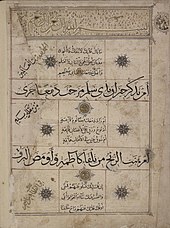Sufi literature
Sufi literature consists of works in various languages that express and advocate the ideas of Sufism.

Sufism had an important influence on medieval literature, especially poetry, that was written in Arabic, Persian, Turkic and Urdu. Sufi doctrines and organizations provided more freedom to literature than did the court poetry of the period. The Sufis borrowed elements of folklore in their literature.
The works of Nizami, Nava'i, Hafez, Sam'ani and Jami were more or less related to Sufism. The verse of such Sufi poets as Sanai (died c. 1140), Attar (born c. 1119), and Rumi (died 1273) protested against oppression with an emphasis on divine justice and criticized evil rulers, religious fanaticism and the greed and hypocrisy of the orthodox Muslim clergy. The poetic forms used by these writers were similar to the folk song, parable and fairy tale.
Sufi poetry written in Persian flourished from the 12th to 15th centuries. Later major poets linked with the Sufi tradition included Hatef Esfahani (17th century), Bedil (18th century) and Ahmad NikTalab (20th century).
References
This article includes content derived from the Great Soviet Encyclopedia, 1969–1978, which is partially in the public domain.